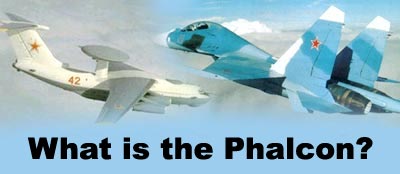Home > News > Specials
The Rediff Special/Josy Joseph
March 09, 2004

India is adding teeth and reach to its air force. If the teeth are the state-of-art Sukhoi-30MKI fighter aircraft, the reach is the Israeli Airborne Early Warning System, Phalcon.
But what is the Phalcon? rediff.com presents a ready reckoner.
What is the Phalcon?
The Phalcon is an Israeli manufactured Airborne Early Warning, Command and Control (AEWC&C) system. It is one of the most powerful such systems in the world. India is buying three of them for $1.1 billion (approximately Rs 5,000 crore or Rs 50 billion).
What does the Phalcon do?
It provides real time surveillance of a few hundred kilometres of territory and also command and control. It can pick up a low flying aircraft, a missile or communication and provide advance warning after correlation. It will help the Indian Air Force to maintain air superiority in a battle. It can pick up an incoming object in all weather conditions, reportedly up to some 300 miles. It can also pick up all sorts of communications from air, sea or land. All the information collected can be conveyed live to the control centre in the headquarters.
How does it pick up information of enemy objects in its area of coverage?
The Phalcon system has four sensors, which coordinate with each other. If one of the sensors picks up an incoming object or enemy communication it automatically co-relates with other sensors and reconfirm. 
How different is it from other Airborne Early Warning Systems (AEWS)?
Most other AEWS are mechanically rotating antennas, or rotodomes, mounted on an aircraft. In the Phalcon it would be a stationary dome mounted on the aircraft and based on an Active Phased Array Electronic Scanning Technology. It would be able to track continuously any fast, high manoeuvring objects in much shorter period of time than the rotodome-based AWACS.
Does it only track incoming objects and communications?
No. The Phalcon is also a full-fledged command and control centre mid-air that can be deployed to direct the aircraft, providing them a picture of the entire battlefield thus allowing them superiority over enemy fighters.
Do Pakistan and China have it?
Neither have it. China was refused the Phalcon in 2000 even after they had paid an advance because of American objections. After India signed the agreement last week Pakistan has threatened to take 'appropriate steps' to match Indian capabilities.
Why is US permission so important for buying the Israeli manufactured product?
America is Israel's key ally and a collaborator in Israel's development of several cutting edge military technologies. The Israeli Aircraft Industries, which produces the Phalcon, has an agreement with some European and US firms, including Raytheon for further research, development and marketing of the Phalcon. India too was given the Phalcon only after US permission. The US had threatened to withdraw financial assistance to Israel if it went ahead and fitted the system on a Chinese plane, which had landed in Israel in 2000.
Is India then the first country to get the Phalcon?
No. Countries such as Chile already have it. But India would be the first country to mate the Phalcon system on the Russian manufactured IL-76 plane. In fact there is a trilateral agreement between Israel, India and Russia on the project. Israel has given an undertaking to Russia not to reveal the technology of fitting it on an Ilyusin to any other country.
The Phalcon has been mounted on which other aircraft?
It can be mounted on various Boeings, C-130 and even an Airbus. Chile's Phalcon system, called Condor, is mounted on a modified Boeing 767.